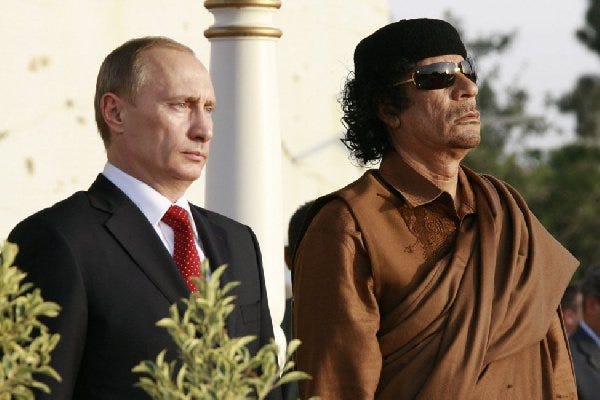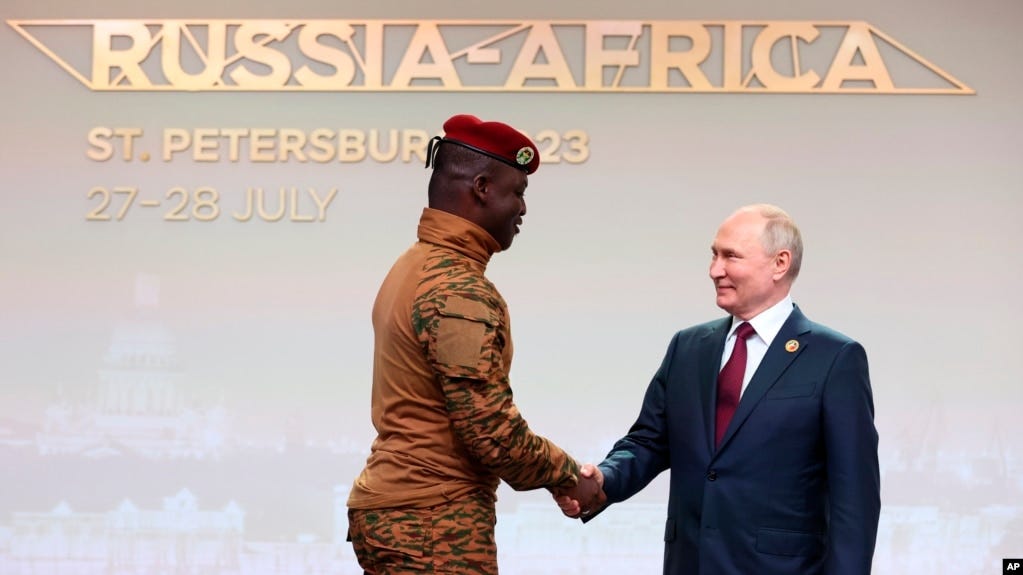Whatever Happened to the Wagner Group?
After Prigozhin, the mercenaries have undergone a rebranding

After the untimely and rather dramatic demise of Yevgeny Prigozhin, Vladimir Putin knew he had to make some cosmetic changes to the Wagner Group. He was never actually going to simply abandon such a profitable and powerful projection of Russian power and influence in Africa, despite the fact that Prighozin went rogue. The ignominious French retreat from the Sahel offered a neocolonialist like Putin an opportunity to make bank and circumvent Western sanctions. How better to erode American influence than to not just survive, but thrive, ensorcelled in Western financial restrictions? In the process, Putin has rebranded the mercenary group’s footprint in Africa “The Africa Corps,” and has vowed to bring the organization’s troop and contractor numbers up to 20,000 by year’s end. That is roughly four times its current level of personnel. There are also recruitment ads on Telegram, a favorite of right-wing authoritarians and their allies.
So, immediately after the former Wagner head’s plane flameout near Moscow last August, Russia’s Foreign Minister Sergei Lavrov stated that the group would continue. But changes, of course, had to be made. Loyalties had to be assured this time around. Putin’s next move after Prighozin was to place the mercenary group under the auspices of the GRU, specifically General Andrei Averyanov. Averyanov is well know to western intelligence agencies. He headed Russia’s infamous GRU unit 29 155, the bridgehead of Russian interference in Europe for nearly a decade.
The Wagner Group, to be quite frank, is just too valuable an institution to Putin and at such little cost to maintain for him to simply toss it aside. A report published last December by the U.S.-based pro-democracy group The Blood Gold Report claims that its analysis “suggests that Wagner and Russia have earned more than $2.5 billion from blood gold [in Africa] since the full-scale invasion of Ukraine in February 2022,” which is pretty astonishing, but not surprising.
How else could Putin, burdened, at least somewhat, by international sanctions, gain access — and plausible legal deniability — to Africa’s natural resources as well as to the continent’s population as potential source of contractors? There is already an ICIJ arrest warrant out on Putin, so he really does not need the publicity for raping Africa. But of Wagner’s sanctions-evading money laundering, we will leave that to the US Treasury.
And then there is Libya, through which the Great Restructuring of Wagner — I can’t bring myself to call it “Africa Corps” — draws its daily sustenance. “Within Africa, Libya boasts the largest oil reserves and gold deposits estimated to rank among the world’s top 50. In addition, its geographic location, linking Niger, Chad and Sudan to North Africa and Europe, makes it of vital strategic importance,” Simon Speakman Cordall writes for Al Jazeera. And antiquities as well, my good man, lets not leave out the mother’s milk of the international black market.
For six years, Wagner has operated in Libya, one of the more profoundly failed states on the planet, with impunity. Khalifa Haftar, then-leader of the Libyan National Army, has been leveraging Wagner against the United States, Putin against Biden. Now the eastern-based Haftar is now the nation’s most powerful warlord, accused of war crimes, which gives him something in common with Putin. So there’s that. But when last September’s floods struck, killing and dispossessing tens of thousands of Libyans in the East, it was American humanitarian aid and airlift capabilities that helped mitigate an even greater disaster. "Haftar continues to be perceived as a pragmatic agent,” Sami Hamdi, the editor-in-chief of the International Interest explained to The New Arab. “The United States implicitly endorsed his plan to seize the capital in 2019, and despite his ties to Russia, there is a sense that he can be won over." Wagner’s attraction to failed states with great mineral reserves is, to be sure, the stuff of legends. The cargo planes hauling gold out of Khartoum, Sudan are well-known, if underreported.
Libya fits the purposes of Russia perfectly in that it is the prototype of a failed state, and thus pliable. It also doesn’t hurt that it is strategically located at the crossroads of Africa, Europe and the Middle East. From Ufuk Necat Tasci of The New Arab:
Jalel Harchaoui, an associate fellow at the Royal United Services Institute, asserts that Haftar's deliberate efforts to strengthen his ties with Moscow, whether through the continued covert presence of the Wagner Group or official engagement with Russia's defence ministry, demonstrate his conviction that the potential benefits outweigh the potential disadvantages.
According to Harchaoui, Haftar has intensified these efforts since August.
“It's important to emphasise that Russia's assistance to Haftar rarely comes without financial demands. Haftar is always required to cover the expenses incurred by the Russians active on Libyan soil - in military and other domains,” he explained.
Biden brings presents; Putin works cheap. But why Libya? Major Thomas D. Arnold wrote for the Center for Strategic and International Studies ties it into Russian history. He wrote this piece in 2020, when Russia only has 1200 contractors, but it adds layers of complexity to Putin’s strategic thinking:
“The Mediterranean basin has historically been strategically important to Russia beginning with a tsarist interest in the Levant and ending with Soviet involvement across North Africa. When viewed through a historical lens, Russia’s return to the region is more routine than revisionist. Russia’s regional strategy for the Mediterranean Basin could best be described as a hybrid of its approach to the Middle East and Africa. At the regional level, Putin’s grand strategy translates into four objectives for the Middle East and North Africa (MENA): (1) support leaders favorable to Russian interests in order to cultivate future clients and erode U.S. influence; (2) become a key player in regional affairs to reinforce Russia’s stature on the global stage; (3) develop economic interests in order to enrich the Russian state and elites; and (4) secure military positions beyond the Black Sea to expand Russia’s confrontation with the West. These regional objectives are largely mutually supporting and clearly align with Putin’s overall strategic vision. Furthermore, the geopolitical realities of MENA—chronic instability coupled with waning U.S. influence—almost compel Russian involvement across the region with Libya being Moscow’s newest prize.”
And, probably, richest on the continent. But Putin has his eye on other prizes. Like, for example, the Ndassima mine, the Central African Republic’s largest gold mine, in which a Wagner front company has been awarded exclusive rights. Further, Sudan has become a great gold smuggling operation for the former Wagner Group, with the processing of gold happening at Al Ibaidiya and the actual smuggling out of the country taking place at Khartoum International airport and Port Sudan. Mali allegedly pays $10 million a month to the criminals formerly known as Wagner, to defend an inept and brutal military junta, for as long as they can hold onto power. For their services, the “Africa Corps” participated in the Moura massacre, where 500 Malians were killed by the junta and their Russian allies.
It is dispiriting that massive human rights abuses by "the Russian company" have been reported in Mali, Libya, the C.A.R, and Sudan but have not seemed to move the needle. All of this occurs at a time of minimal interest in international news as foreign bureaus scale back and people retreat into celebrity gossip and domestic elections. And it is, tragically, testament to how little these African military juntas contracting Wagner to prolong their illegitimate rule give a damn about their citizens. If their own governments — unelected and out for mineral wealth — don’t care, then who, indeed, will?

“He filed for four bankruptcies between 1991 and 2009, or as he has put it, took advantage of “the chapter laws.” He lost his casino jewel, the Trump Taj Mahal first, then the Plaza Hotel, then the rest of his Atlantic City casino empire in 2004 (the same year Mark Burnett created The Apprentice, with Trump playing a successful businessman). Then finally, in 2009, Trump Entertainment Resorts kicked him off its board but kept his name on the brand. But Trump can rightly claim his bankruptcies were smart. No shame in bankruptcy if bankers think they have no other choice but to cover you. In debt close to a billion dollars, and faced with reluctant bankers, he nearly lost it. While the bankers were convening and trying to come up with a plan, he holed up with bags of McDonald’s in his bedroom, refusing to speak to anyone for days. Biographer Harry Hurt III even wrote that some people close to him worried about suicide. The story of how he rose from his bed, outsmarted the bankers, got out of that hole, and managed to survive and thrive, living on to play-act a successful businessman on television for more than a decade, is a master class in coddling and entitlement. He was simply too big to let fail.” (Nina Burleigh/American Freakshow)
“While she was the Village Voice’s nightlife columnist in the aughts, Tricia Romano, author of ‘The Freaks Came Out to Write: The Definitive History of the Village Voice, the Radical Paper That Changed American Culture,’ was also working as a DJ in the downtown New York club scene. Spinning records, it turns out, was an ideal background for preparing this oral history, which is composed of original interviews and archival material mixed to perfection by a writer who knows how to keep a party flowing. In his New York Times review, Dwight Garner said that this ‘disco ball of a book’ might be ‘the best history of a journalistic enterprise’ he’s ever read. Founded in 1955 by Dan Wolf, Ed Fancher and Norman Mailer, a trio of World War II veterans learning on the fly how to launch a newspaper, the Village Voice was conceived as a combination Greenwich Village bulletin board and speakers forum. The goal was to create a publication capable of keeping pace with a vanguard neighborhood’s extraordinary political and artistic ferment.” (Charles McNulty/LAT)
“President Joe Biden spent most of his recent State of the Union address celebrating his economic record, with good reason. There is no denying the numbers: The United States currently enjoys the highest rate of economic growth among nations in the G7, the lowest inflation, and the strongest wage growth. The unemployment rate hasn’t been this low for this long in half a century. Even accounting for inflation, wages are higher today than they were before the coronavirus pandemic, and the biggest wage gains have accrued among the lowest-paid workers, resulting in a dramatic reduction in overall wage inequality. The economy is even outperforming among communities that are often excluded from boom-time gains. Biden has overseen the lowest Black unemployment rate on record and the lowest ever unemployment rate for workers with disabilities. The American economy isn’t perfect, but by any historical standard it is very, very good.” (Zachary D. Carter/Slate)
“With coiffed blond hair, high cheekbones, and a wide smile, Alicia caught the eye of many men, including the future President Kennedy. Many agree that the two at least had a relationship. She would later tell an Italian magazine, with perhaps more regard for narrative flair than the truth, that the pair became engaged in 1951. But, she continued, it was called off by Kennedy’s father, Joseph, because of her Jewish heritage. After the breakup, Alicia went Hollywood. While she didn’t score any film roles, she certainly made a mark on the Tinseltown social scene, being romantically linked in gossip magazines to stars like Gary Cooper and Tyrone Power. She married her first husband, British actor Edmund Purdom, in 1957 … In addition to the drama in her then marriage, Alicia nursed a grudge toward her politician ex, and decided to sue JFK, who was then the president-elect. According to the New York Times, Kennedy’s younger brother Robert quietly settled the claim in 1961 for $500,000 (equivalent to $4.3 million today) and had all the details of the suit — including the reason for it — sealed by the court. The settlement was suspicious enough to catch the attention of J. Edgar Hoover. The infamous FBI director informed Bobby Kennedy that he knew of it in 1963 — although not even Hoover could say what the suit was about. Whatever the Kennedys were trying to hide, Hoover cautioned that it might have been explosive enough to hurt JFK’s reelection campaign.” (Avenue)
“Undersea cable companies that extend internet services to West and Central Africa estimate that it could take five weeks to repair damages to their facilities noticed last week. Widespread internet outages in Nigeria, Ghana, Senegal and Côte d’Ivoire were reported on Mar. 14, making many websites unavailable and disrupting online banking operations. Some of the difficulties have eased in the days since but a weeks-long timeline for fixing the cause means internet access will remain spotty. Ghana’s National Communications Authority said the five-week estimate is ‘for full service restoration from the time the vessels are dispatched to the various locations.’ The regulator said it met with the four leading cable landing service providers: Africa Coast to Europe (ACE), MainOne, South Atlantic 3, and the West Africa Cable System (WACS).” (Alexander Onukwue/semafor)



